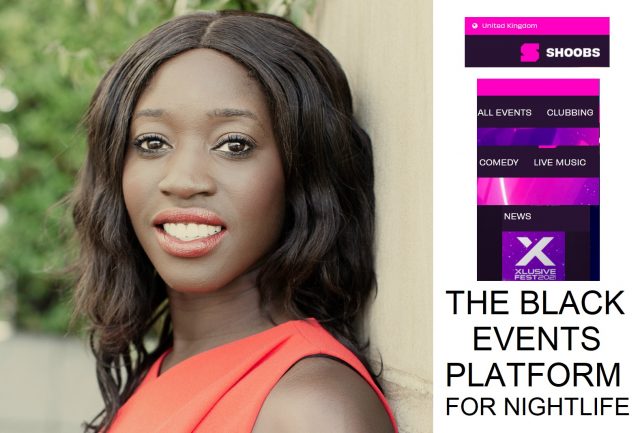BEHIND THE BRAND: Shoobs Founder Louise-Broni Mensah
by Annette Abena
First Published September 1, 2018
Louise Broni-Mensah is the founder of Shoobs an events discovery and booking platform and a go-to for many night outs. Born in London, Louise has gone from banking in the city to raising money for her events tech startup in Silicon Valley…
What is your background? Where are you from? What is your current role?
I’m Louise Broni-Mensah Founder of Shoobs an events discovery and booking platform focussed on urban nightlife events. In terms of my background, I’m a British Ghanaian, born and bred in North London. I studied mathematical economics at the University of Birmingham but I’ve always had a real passion for music and events. At university, I was a Campus Rep for Sony Music. The role consisted of promoting their artists on campus and getting their music played on the university radio station. I also did various internships at record labels in London including Sony Records and Relentless Records (the label behind Joss Stone and So Solid Crew). I eventually went into banking after university but always kept my music passion alive by getting involved in it with any spare time that I had which included managing a Hip-Hop artist. It was from that experience that led me to start Shoobs. So I guess now I am fully involved in my passion by running a music and events tech start-up.
You took a very traditional route into business: school, university and city job before launching your career in music. If a career in music was supported early on do you think you would have taken this route?
I actually really enjoyed my degree. I was a bit of a maths nerd in school so I was happy that I got to do a maths based degree at uni. I thought I would end up in finance eventually and being born to Ghanaian parents my mother wasn’t too keen on me doing something like media studies at university. So I went into finance partly for my parents but really when it came to looking for jobs in media and music they were really low paid. But I would say though even if I could go back in time, you know how they say ‘parents know best’… I actually wouldn’t change anything!
However, I think if I did have the support I probably would have gone into music. And support could mean many things. One, support in terms of my parent’s blessing and two, possibly their financial backing. I’m from inner city London with a lower middle class/ upper working class background, born to immigrant parents and so I recognised that I couldn’t live off my parents support and had to make it on my own. There are people out there that do have that advantage and so can have a career where at the beginning its low or even no pay in music, fashion and other creative industries. I didn’t have that so I essentially had to go where the money was. Saying that I learned so much and had such a good level of experience in banking so I am really happy I worked in the corporate world. Ultimately as a CEO although I work in events I am trying to build a large company so the experience and foundation I got from banking was phenomenal. So if I were to advise my daughter too I would definitely encourage her to follow her passions but emphasize the importance of a strong foundation.
What advice would you give others in the Ghanaian diaspora about pursuing careers in non-traditional industries like music?
I would say get as much experience as possible – intern! For me doing work experience was key. I did it in music but also in finance too. I realised that whatever I wanted to do in the future I wanted to be able to display an impressive CV and demonstrate that I was really dedicated to the role or industry I was applying to. I think this really impresses employers.
How did you gain experience in the music industry?
I literally had no contacts or anything like that. I actually wanted to work in the US as I saw how the industry was booming there and was fascinated by the likes of P.Diddy (Puff Daddy back in the day!) and read about how he used to work for Columbia Records as a College Marketing Rep and thought that’s what I needed to do. So I contacted Columbia who were part of Sony Music in New York (I literally called a random number I found on Google) about a College Rep position. The guy on the other side of the line although a bit confused by this girl calling from London was super helpful and told me about their London programme. He introduced me to the team via email and then I had an interview and managed to secure the role. I would say to young people who say “oh I don’t have the contacts or the network” you can make that happen. As I said I just googled whoever was in charge of college marketing and I called that person cold. I think sometimes people are impressed by the guts it takes going for what you want.
Right now there are so many resources out there that just means that anybody can start anything! Back when I wanted to be a music manager I was going from gig to gig to find artists now you just find them on Youtube or Instagram. There’s now no reason not to go for what you want and the people that do are willing to put in the work and put themselves out there.
You became the first Black female entrepreneur to secure capital from a seed fund provider in Silicon Valley. The statistics for female founders securing VC funding is shocking let alone for Black women.
What are your top tips for securing funding particularly for:
(a) founders within the diaspora and;
(b) female founders
The first thing that I would recommend is to look at founders or companies you admire and find out what their fundraising journey was. Who invested in them in the beginning? Where was their first cheque? This could be a founder or company you admire or a company that is in a similar space as you. I looked at companies such as Airbnb which is essentially a booking company for accommodation and I was so impressed by their founders and their story. They were 3 guys who were struggling to raise money for years until they came across YCombinator in Silicon Valley and that just changed the entire trajectory of their company. I also read about Rap Genius (which is now called Genius) who annotate rap lyrics so they occupied the urban space. Similarly, it wasn’t exactly what I was doing but it was all about promoting urban culture but they were doing it through music lyrics. Again, I discovered that they got started through Ycombinator. I began to realise that this Ycombinator was the place that you go when you wanted to start a company. I wanted to emulate their success so I thought I’d try. As I looked into it I began to learn more about Silicon Valley as a whole and realised how many amazing companies came out of it. I acknowledge that it isn’t the only place where great businesses can get started but in the same way that if I wanted to become a successful actress I’d have to spend a bit of my time in Hollywood – you’ve got to go where the action is! So I took myself there and applied to Ycombinator.
They hadn’t invested in a black female founder before but I didn’t actually know that fact at the time. There were already a number of things that were against me aside from my gender or race. For instance, they do not normally take solo founders or founders that are not technical. On top of that many people had told me not to bother applying but I wanted to take the risk. Rules are meant to be broken and there’s always an exception to every rule! Plus I knew that I had already built a great company and had had some great traction in London. Thankfully after my application, I managed to get shortlisted for an interview, after which they finally decided to invest in Shoobs.
I’d say as a black founder and/or a black female founder, although the statistics may be against us I think it’s all about breaking those barriers and pushing to be the first – why not? As I said, there’s always an exception to the rule and you can be that exception.
What’s it like being a solo founder? What are some of the benefits and drawbacks?
Firstly, I had an idea and I just wanted to go for it. I didn’t stop to think about whether I needed a founder as I just wanted to get on with it. Even till now being a solo founder just means I can make decisions really quickly. Obviously, I do consult my team but I can just go ahead and make decisions when I need to without having to discuss it with a co-founder. But of course running a business is tough and a somewhat lonely journey so I wouldn’t recommend for or against having a co-founder as I can definitely see the benefits of having one! There’s a different burden you have as a founder compared to an employee so it would be nice to share the (professional and personal) burden and bounce ideas off someone. Maybe if I could do it again I’d have a co-founder but it really just depends on you as an individual.
It’s such an exciting time for the African music industry with Afrobeats and ‘Afro swing’ in the UK growing in popularity in recent years. Do you have plans to internationalise Shoobs into African markets?
Yes absolutely. The growth of Afrobeats, Afroswing and all the different derivatives of African music has been phenomenal in the UK and across the globe. We had Afrorepublik at the o2 Arena with Wizkid headlining and in January next year, we’ll have Davido headlining. These are groundbreaking things that are happening across the board which is fantastic. Shoobs has always been passionate about Urban culture as a whole as well as Afrobeats. We obviously started the company a few years ago and we are now seeing this growth which is really exciting. Saying that one thing I’d say to young entrepreneurs is that some people may say your idea is just too early. A few years ago when I started people would ask: “why are you just focusing on just urban? Isn’t this niche too small?” But it was something I was passionate about and I was also frustrated that the urban scene was always so forgotten and underground. I felt strongly that it needed to be showcased and have a proper platform where you could find events. So there may be some founders out there who have an idea that they think may not make a lot of sense right now and my advice would be to hang in there! If you have the perseverance to see it through, let those years go by and you will just be building momentum. They say that luck is preparation and opportunity meeting and although it feels like Shoobs has come at the right time in actual fact we’ve been preparing for this for a long time and now the opportunity is here. Often when you are doing something really groundbreaking you’ve got to be ahead of the curve and that’s what we’ve done at Shoobs so it’s great to see how well Urban is being received now.
Shoobs has made it easier to discover events and given a much-needed platform to ‘urban’ event organisers, artists and party-goers. What’s your take on the reality that often simply enjoying or putting on events is a challenge for black party goers? What can be done to change things?
I definitely see the problem – we are very close to it and see it first hand. I think ultimately what the scene needs are more owners. When we are owners of things that’s when we can drive change. That’s what I learned from the Urban artists in America like Jay Z and what he’s trying to do with tidal and what P.diddy has been doing. When you become an owner that’s when you have power, that’s when you have clout. I recognised my responsibility as I was building Shoobs as a black woman and I was proud of that as we’re often not owners. I would even say to black promoters and event organisers to push the level of ambition to come together and invest in good quality venues so that they become the owners and ensure that discrimination doesn’t occur. An event organiser starting out today with a student brand should be thinking about building his or her platform into the next Glastonbury because Glastonbury also started off as a small event. It just takes a few to actually take it to that next level and that’s what we’re trying to do at Shoobs.
What are your future plans for Shoobs?
I’m really passionate about building an impactful global company but ultimately our mission is to promote urban culture and to be part of that success story. We’re a business predominately started in London and we just want to be able to replicate what we have done across the world and that’s the next big step for us.
Louise is an inspiring example of resilience and a trailblazer for young black female founders in business – her Ghanaian roots are just a bonus!
Source: theonlywayisghana.com










